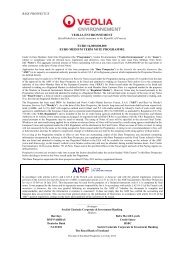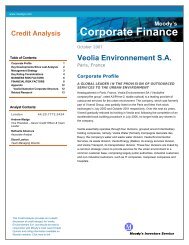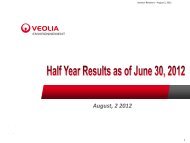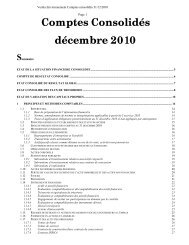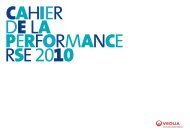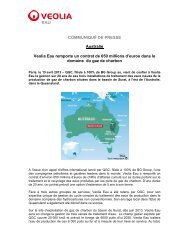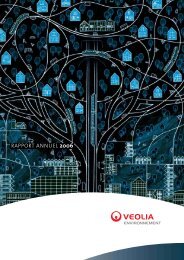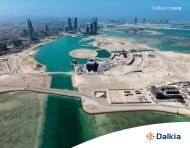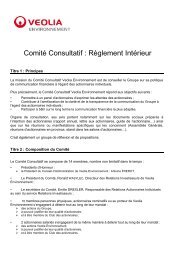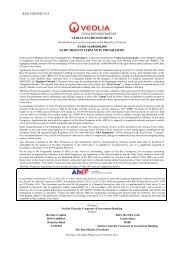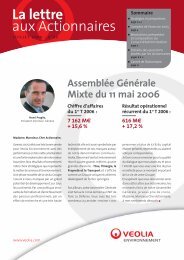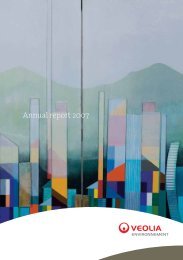Business Overview 2009 (pdf - 6.8MB) - Veolia Water
Business Overview 2009 (pdf - 6.8MB) - Veolia Water
Business Overview 2009 (pdf - 6.8MB) - Veolia Water
You also want an ePaper? Increase the reach of your titles
YUMPU automatically turns print PDFs into web optimized ePapers that Google loves.
Our achievements /<br />
Pushing back the boundaries<br />
of our business<br />
The global economic crisis<br />
and awareness of<br />
sustainable development<br />
challenges are giving rise to<br />
new customer expectations.<br />
In response, <strong>Veolia</strong> <strong>Water</strong> is<br />
leveraging its expertise and<br />
sense of innovation to push<br />
back the boundaries of its<br />
activity, while always<br />
seeking to reconcile human<br />
progress with the planet’s<br />
future.<br />
Taking up the energy challenge<br />
All means of energy production require water and vice<br />
versa. In the United States, a third of water withdrawals are<br />
used to produce energy (source: US Department of Energy,<br />
2006). For most clients, given the threat of climate change,<br />
the aim today is to view the issues from an overarching<br />
perspective and to manage the water/energy equation.<br />
In this context, at <strong>Veolia</strong> <strong>Water</strong>, we are continuing to make<br />
progress in optimizing our energy production and<br />
consumption. Worldwide, we operate more than a hundred<br />
anaerobic digesters treating wastewater sludge, a<br />
significant part of which can be harnessed to recover the<br />
energy from the biogas. In western France, leading poultry<br />
supplier LDC opted, when renewing its contract in <strong>2009</strong>,<br />
to recover the effluent from its production line to produce<br />
biogas. A cogeneration plant is now being built to produce<br />
electricity and heat, which will be sold through<br />
a partnership contract with EDF Energies Nouvelles.<br />
In Madrid, Spain, the country’s largest wastewater<br />
treatment plant, contracted to <strong>Veolia</strong> <strong>Water</strong> in <strong>2009</strong>,<br />
includes a sludge digester and an associated cogeneration<br />
plant that will generate electricity and produce heat<br />
(18,500 MWh of electricity per year, which is more than half<br />
the plant’s annual consumption).<br />
<strong>Veolia</strong> <strong>Water</strong> is in the forefront of energy efficiency<br />
programs in Central Europe. Its subsidiaries in the Czech<br />
Republic and Hungary continually share best practices<br />
to extend the range of operating methods and the portfolio<br />
of technology. For the Budapest, Hungary, contract,<br />
they implemented the Ecrusor® system that recovers<br />
biodegradable liquid after breaking down solid waste,<br />
and significantly boosts biogas production.<br />
The experience acquired in cogeneration in Central Europe<br />
has been key to pushing ahead and designing the energy<br />
self-sufficient wastewater treatment plant. The aim is for<br />
the plant to cover all its energy needs by consuming less,<br />
using technologically optimal processes, like the Amonit<br />
process (see page 22), and by maximizing the production<br />
of biogas. With regard to this latter point, a new two-step<br />
sludge digestion process was patented in March <strong>2009</strong>.<br />
Currently at the industrial prototype stage, it should be<br />
operational in 2010.<br />
Contribute to reducing greenhouse gases<br />
Analyzing their own sources of emissions in order to reduce<br />
them has become a central issue for companies, which<br />
will increasingly shift to the use of green technology.<br />
<strong>Veolia</strong> <strong>Water</strong> has the resources to help them minimize their<br />
42 <strong>Veolia</strong> <strong>Water</strong> <strong>2009</strong>



